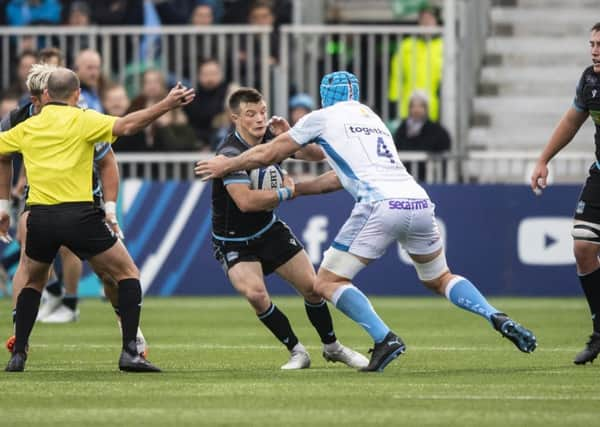Allan Massie: Good wins but weekend results are still a wake-up call


It was partly the powerful, mostly South African, replacements Steve Diamond sent on that turned the match in Sale’s favour, but in truth Glasgow should have been out of sight by half time. As it is, they may have felt relief at securing victory and four points but they must know that they should have had five, know also that to finish top of what is likely to be a tight pool, failing to get a four-try bonus point in your home matches will make things difficult for you. The knowledge that Exeter Chiefs not only beat La Rochelle away but scored the four tries that gave them a bonus point drives the point home. It’s uphill work for Glasgow from now on.
They were so dominant in the first half at Scotstoun that you kept thinking the tries must come. Instead there was only one, a very nice one which however emphasised what Glasgow were otherwise getting wrong. It came from quick thinking and neat handling by George Horne, pictured, and Sam Johnson which gave D T H van der Merwe the sight of the try-line that is all he needs. Yet on the several occasions when Glasgow were pressing hard in the Sale 22 they ignored their backs while the forwards made attempt after attempt to force their way over the line with pick-and-drives or drives after one short pass. The defence held and Glasgow asked its pack to do the same again and again, which it did.
Advertisement
Hide AdAdvertisement
Hide AdOf course when forwards are close to the try-line they always believe they can score. Sometimes, even quite often, they do, but just as often their efforts end with a turnover, a knock-on or a penalty against them for holding on in the tackle. What cost Glasgow dear was a lack of intelligence, not effort.
Today they go to Sandy Park, where Exeter stifled them three years ago on a disagreeably damp evening. That day, I concede, Exeter scored tries the way Glasgow tried to score them against Sale. They are one of the two best sides in England, one that is still improving, and, despite a surprisingly poor and disappointing record in Europe, are still among the favourites to win this season’s Heineken. Their recruitment of Stuart Hogg indicates their eagerness to play a more adventurous game. Frankly, Glasgow will do very well this afternoon if they prevent Exeter from scoring four tries and themselves come away with a losing bonus point.
While it was good to see Edinburgh begin their Challenge Cup campaign with a handsome away win against Agen, the weekend offered what for us may be a salutary shock or, more fairly, a wake-up call. Whereas one of our two pro teams is in the subsidiary European competition, all four Irish provinces are in the Champions Cup, and not only that, but all four won last weekend. Connacht were regarded as the poor relation of Irish rugby. When development of the Sportsground in Galway is completed next summer it will hold a bigger crowd than Scotstoun, as big as Edinburgh’s new stadium on the Murrayfield back pitches. The population of Galway at the 2016 census was just under 80,000.
We have now had almost a quarter of a century of professional rugby. Ireland has made a great success of the transition from the amateur game. Scotland hasn’t. Ireland have won the Six Nations, Scotland haven’t. Leinster, Munster and Ulster have all won the Heineken; neither Glasgow nor Edinburgh has got beyond a semi-final. All the members of the Ireland squad play their club rugby for Irish provinces. Six of Scotland’s World Cup squad play for French, English or Welsh clubs, and Stuart Hogg can now be added to that list.
The present administration at Murrayfield has repaired what was a dire financial position. Full houses have returned to Murrayfield. This season’s Six Nations matches against England and France have already been sold out. All this is praiseworthy. Yet, while it would be unjust to say there has been no comparable investment in the professional game, it is undeniable that Scotland, like Italy, stands in the same relation to England, France, Ireland and even Wales (where the transition to professionalism has been ill-managed at club level)as Connacht have historically to the other Irish provinces. We are the poor relations.
This being the case – surely an undeniable case – it is pointless to bewail our lack of success at both national and club level. The truth is that when we win we do so against the odds. It is as unreasonable to expect Scotland to win the Six Nations, let alone the World Cup, or for Glasgow or Edinburgh to win the Heineken, as it is to expect Aberdeen, Hearts or Hibs to dislodge Celtic and Rangers at the top of Scottish football.